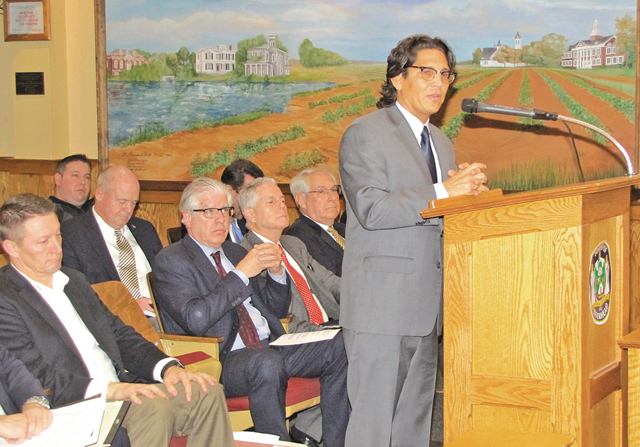Calverton addiction treatment center seeks tax break


The developers of a proposed addiction research and treatment center at the Enterprise Park at Calverton are seeking a 20-year payment in lieu of taxes agreement that would save the company an estimated $23 million in taxes over the length of the arrangement.
Under the proposed payment agreement, payments would start at $80,000 and increase by 2 percent each year for a total of $5.56 million, the applicant said Monday night during a public hearing before the Riverhead Industrial Development Agency.
The proposal by Calverton Addiction and Treatment LLC calls for six buildings comprising 134,000 square feet on about 37 acres at EPCAL, with the goal of providing both drug and alcohol treatment and research. The land is currently vacant and the property owner, Engel Burman of Garden City, pays $201,787 in taxes.
The tax exemptions sought by the applicant also include mortgage recording tax exemptions and exemptions on sales tax used during construction of the project. The applicant also plans to set aside 58 of the 95 acres on the property to remain undeveloped.
Calverton Addiction and Treatment LLC’s proposal will create 50 jobs within two years with average salaries and benefits of $100,000, according to Peter Curry, an attorney for the applicant.
The economic impact of the construction will be $65 million, he said.
“The addiction issue is the number one health crisis facing the U.S. right now,” said applicant Andrew Drazen, adding that 174 people die every day in the U.S. from drug overdoses.
Suffolk County is the number one county in New York State in terms of addiction-related fatalities, with over 300 deaths last year, he said.
Mr. Drazen said that having people on site who are being treated for addiction and have also agreed to be part of the research is a major change in the way addiction is approached.
Steve Chassman, director of the Long Island Council of Alcoholism and Drug Dependence, said his 61-year-old organization “never been as busy as in the last five years.”
Mr. Chassman said 64,000 people died of drug overdoes last year in the United States, and another 88,000 died of alcohol-related illnesses.
Ron Fisher, a member of the Riverhead school board, said it was a “wonderful project.”
“I don’t know of a single person who has not been affected by addiction,” he added.
But when Mr. Fisher asked the board how the requested property tax abatement would affect school taxes, no one seemed to want to answer.
IDA chair Tom Cruso said that question should be directed to the applicant.
“We haven’t broken it out among various taxing jurisdictions,” Mr. Curry said. “We are looking to pay a PILOT. It won’t be zero. It will be greater than zero and will increase over the course of 20 years.”
He said because school taxes increase, determining an exact figure is difficult.
Mr. Cruso said the board “hasn’t even had an opportunity to do the research” on the PILOT number sought by the applicant.
“It’s tough to weigh in and give you any educated feedback on what it could be, without that information,” Mr. Fisher said.
He said the school district is concerned that abatements of school taxes will make it more difficult for the district to budget.
School board member Laurie Downs echoed that concern.
The actual number proposed in the PILOT was never publicly stated during the meeting, but IDA members did give a copy of the PILOT schedule to the News-Review after the meeting.
The IDA closed the hearing without ruling on the request, but indicated it would be discussed at a future meeting. IDA members, who have faced criticism recently for giving tax breaks, stressed that the numbers were the applicant’s request, and not theirs.
Photo caption: Steve Chassman, director of the Long Island Council on Alcoholism and Drug Dependence, speaks in favor of Calverton Addiction and Research Center at Monday’s IDA meeting. (Credit: Tim Gannon)








